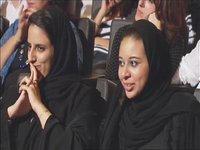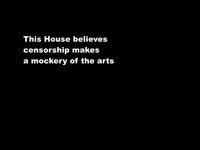This House believes censorship makes a mockery of the arts
Monday May 21 2012
MOTION PASSED
by 58% to 42%
Details

Doha, Qatar, May 22, 2012 - An audience at The Doha Debates has publicly expressed opposition to state censorship of the arts, still strongly enforced in the Gulf and the wider Middle East.
The rare display of frustration with the practice surfaced in a lively session as participants discussed a range of issues, including the frequent cuts made in foreign films shown here and the blacking out of bare female flesh in Western magazines.
A show of hands indicated that around a third of the mainly Arab audience still supported state censorship.
In the end, though, they voted 58 percent in favour of the motion: ‘This House believes censorship makes a mockery of the arts’.
Speaking against the statement, Iraqi American Nada Shabout said "local context and cultural sensitivity" had to be respected, especially in Gulf universities which had recently introduced classes in modern art.
"It reflects the needs of the audience," added Shabout, the director of the Contemporary Arab and Muslim Cultural Studies Institute at the University of North Texas.
"What is the point of shocking the audience?" she asked. "Art is about pushing boundaries and you slowly push them more and more to create the right spaces for debate."
Arguing on the same side, Peter Florence, British founder and director of the Hay Festival which showcases writers from around the world, said the motion had to be opposed because it was "stupid and offensive" and because censorship did not work.
"You can kill the artist," he said. "But you cannot kill the art. It survives in the public imagination."
"Censorship does not make a mockery of the arts. It brutalizes the arts...and worst of all it is murderous!"
Nat Muller, independent curator and art critic living between Europe and the Middle East, said art was about pushing "the boundaries of what is acceptable in form, in aesthetics, in ideas and in concepts and about taking people out of their comfort zones".
She added: "We cannot let the argument of cultural sensitivity become a euphemism for political or cultural repression every time governments, donors, audiences or others do not like, disagree or feel uncomfortable with the work of art."
Arguing for the motion, Syrian Malek Jandali, who received the 2011 Freedom of Expression Award for his controversial song "Watani Ana" or "I am my homeland" said art was about life. Anyone banning it was hindering progress.
He strongly rejected the argument that censorship protected people from inappropriate images. "Nature knows no indecencies," he said. "Indecencies are only in the mind of people. We invented them."
Watch online





